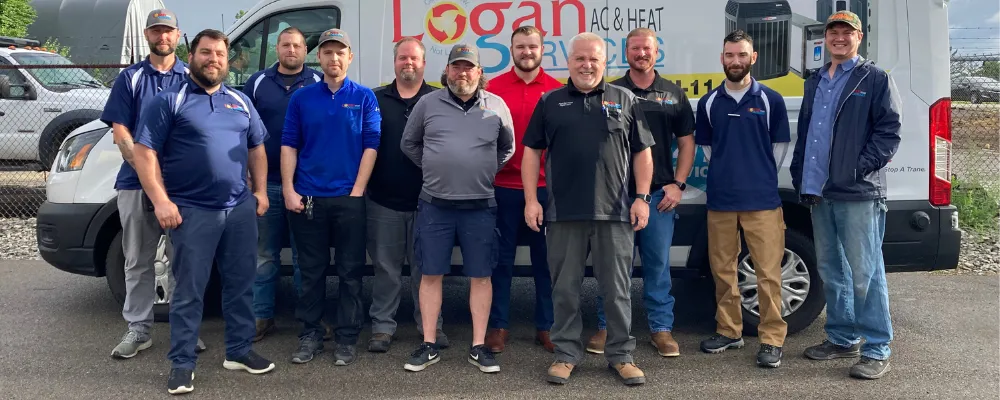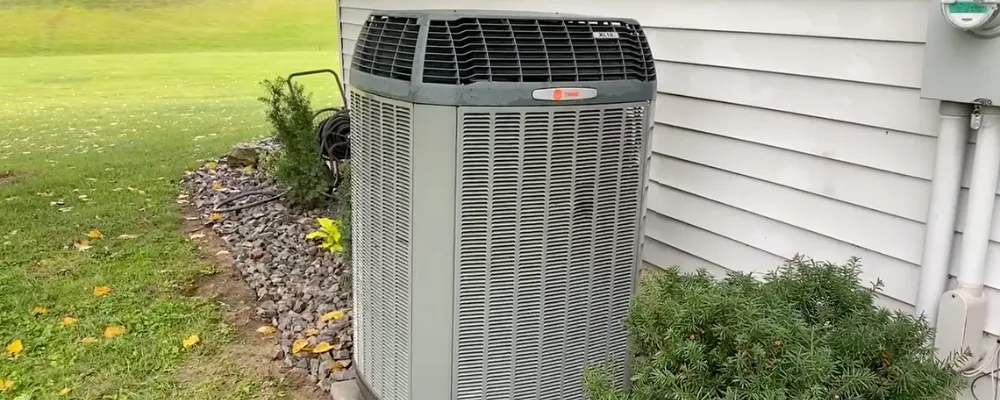Curious about the lifespan of your AC unit? There are many factors that influence how long your unit will last, from unit quality to regular maintenance. If you take good care of your AC unit and invest in repairs as needed, your unit may last as long as 15-20 years. Let’s take a look at the factors affecting AC unit longevity, and what you can do to extend its lifespan.
Importance of AC Unit Longevity
Longevity or lifespan of an air conditioning unit is a critical consideration for homeowners and business owners alike. Not only does a reliable and durable AC unit offer consistent, efficient cooling, but it also contributes to enhancing indoor air quality over its extended operational life.
Why is the Longevity of Your AC Unit Important?
There are several reasons why AC unit longevity is a hot topic with homeowners. Here are a few key benefits of a system that remains in good condition throughout it’s lifespan:
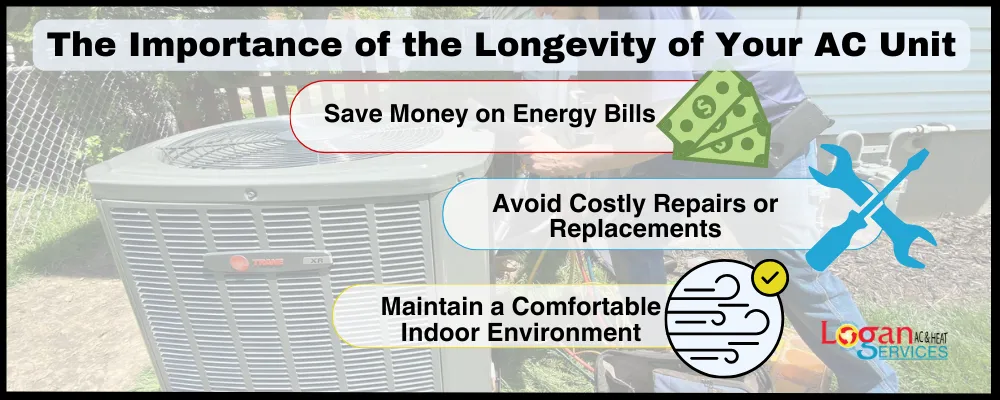
- Save Money on Energy Bills: An AC unit that operates efficiently over the years results in considerable energy savings. By installing a high-efficiency cooling system with routine maintenance performed annually, you can expect to maintain a high level of efficiency, which translates to lower energy bills throughout the life of the system.
- Avoid Costly Repairs or Replacements: An AC unit that is not properly maintained might frequently malfunction, triggering premature replacements or expensive repair services. On the other hand, an air conditioning unit that’s properly cared for can significantly cut these unwanted expenses, contributing to cost efficiency in the long run.
- Maintain a Comfortable Indoor Environment: A well-maintained AC unit will keep your indoor environment comfortable for many years. It reduces the chances of unexpected breakdowns in your cooling system, ensuring a consistently comfortable indoor temperature and improved air quality.
Factors that Affect AC Unit Lifespan
Various factors influence the lifespan of an air conditioning system:
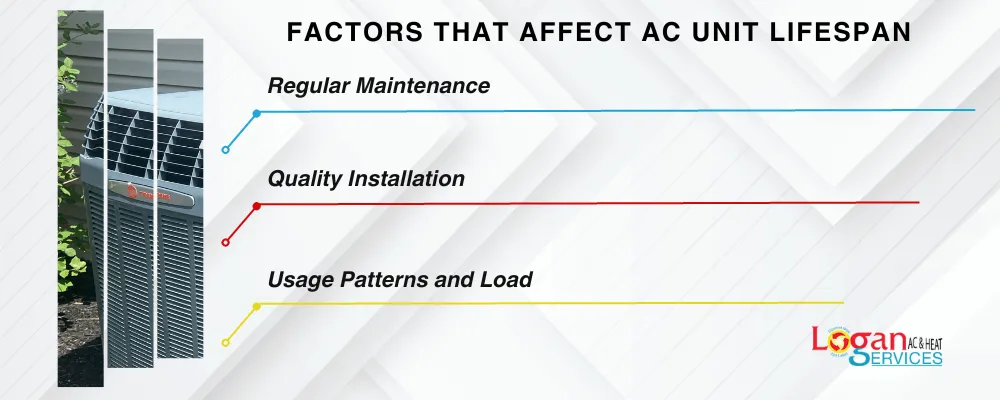
- Regular Maintenance: One of the most critical factors impacting AC unit longevity is regular maintenance. Regularly cleaning and replacing air filters can immensely improve your air conditioner’s performance and longevity.
- Quality Installation: A properly installed AC unit is more likely to last longer. Ensuring your air conditioning unit is installed by a certified professional can significantly influence its lifespan, offering optimum cooling and improved air quality for many years.
- Usage Patterns and Load: The more frequently and intensively an AC unit is used, the faster it wears down. Therefore, moderating the usage and load on your air conditioning system, while not compromising on comfort, can noticeably extend its lifespan.
Tips for Extending the Lifespan of Your AC Unit
With a few practical steps, you can help extend the lifespan of your AC unit, ensuring it works efficiently for longer.
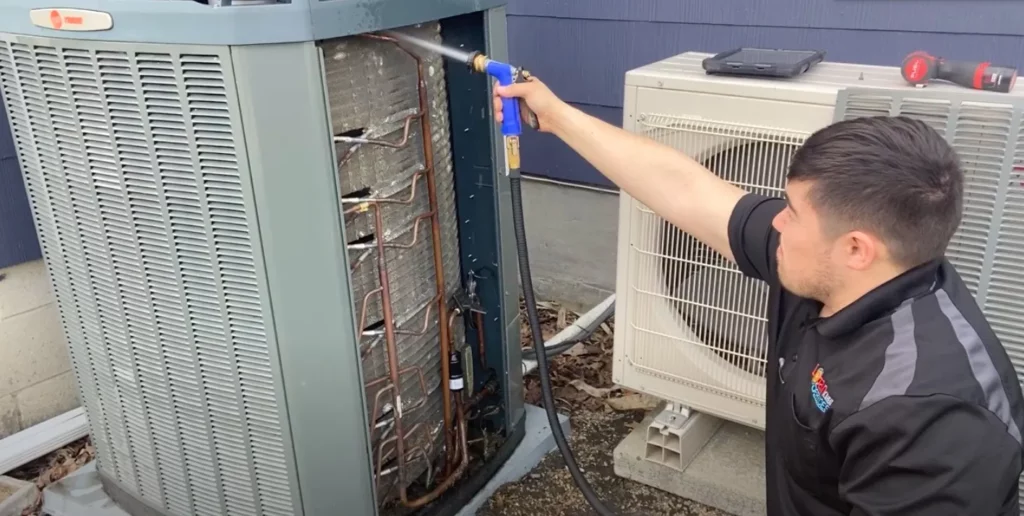
Regular Maintenance
Ensure regular cleaning or replacement of air filters, annual professional servicing of the AC unit, and frequent checks of both indoor and outdoor units for any potential issues. Consider regular maintenance as a way of securing a long-term investment on your air conditioner that ensures a smooth and efficient function over its lifetime, while also significantly improving indoor air quality by removing pollutants from the air you breathe at home. In addition to these benefits, here are other reasons why regular AC maintenance is so critical:
- Reduces Wear and Tear: Just like any other machine, air conditioners have components that are susceptible to natural wear and tear. This could be the outdoor unit, certain components of the cooling system, or even the air filter. Regular maintenance helps identify and address these issues well in time, preventing potential future problems and increasing the unit’s longevity.
- Prevents Minor Issues from Turning Into Major Problems: All HVAC systems, including your air conditioner, are complicated units made up of several components. Even a minor, unattended issue in its early stages can escalate into a major problem requiring expensive repairs. Regular maintenance prevents such muddled situations by rectifying minor issues before they snowball into major ones.
- Promotes Efficient Operation: A well-maintained air conditioning system not only provides a comfortable indoor climate, but also operates more efficiently. Regular checks and servicing can significantly cut down power consumption, leading to reduced energy bills. At the same time, it maintains a high-quality air output, contributing to a healthier and more pleasant environment in your home.

What are Regular Maintenance Tasks?
It’s clear that regular maintenance is important, but what does this maintenance involve? Here are some of the key maintenance tasks, most of which should be performed by a professional.
- Changing Air Filters: One of the most critical regular maintenance tasks is changing air filters. A dirty air filter can restrict airflow and force the system to work harder, potentially leading to damage and reduced efficiency. Therefore, replacing air filters regularly is essential for the well-being of your air conditioning unit.
- Cleaning Condenser Coils: The condenser coils located in the outdoor unit of the AC system are responsible for expelling the heat removed from the air by blowing it outside the building. If these coils get covered in dust or debris, the system will have to work harder to function, leading to increased wear and tear. Having an HVAC professional regularly clean these coils can help maintain the system’s efficiency and longevity.
- Checking and Cleaning Evaporator Coils: Evaporator coils absorb heat and humidity from the air. Over time, these coils can become corroded, affecting their ability to absorb heat. By having an HVAC professional check and clean these coils, you’ll ensure your AC system continues to cool your home efficiently.
- Inspecting and Cleaning the Blower Motor and Fan: The blower motor and fan play an integral part in your central air system. They circulate conditioned air throughout your home and allow for balanced cooling. Therefore, it’s imperative to have a professional regularly inspect these parts to ensure they are clean and working properly. Delayed attention could lead to a decline in air circulation and cooling capacity.
- Lubricating Moving Parts: AC units have moving parts that require regular lubrication to reduce friction and ensure smooth operation. Neglecting this key maintenance task may lead to a decrease in operating efficiency and even system failure in severe cases.
- Checking Refrigerant Levels: Refrigerant is the lifeblood of your AC system. Over time, levels may drop due to leaks or evaporation, resulting in decreased cooling capacity. As part of regular maintenance, refrigerant levels should be checked and topped up if necessary.
- Cleaning Debris: Finally, the area around your AC unit should be kept clear of leaves, grass clippings, debris, and other obstructions. These can restrict airflow and hamper the efficiency of your system. In addition, outdoor units should be checked for any accumulated debris within the unit itself.
Quality Installation
In addition to maintenance, it’s critical that your AC unit is installed properly for maximum longevity. Quality installation is crucial as it ensures that the AC unit is properly sized, placed, and affixed.
Importance of Quality Installation
A high-quality install can drastically improve the performance and longevity of the AC system. If a system is not correctly installed, it can cause issues like improper airflow and inadequate cooling. It’s also detrimental to its energy efficiency and could lead to higher utility bills. Here’s why it’s critical to invest in AC installation from HVAC professionals:
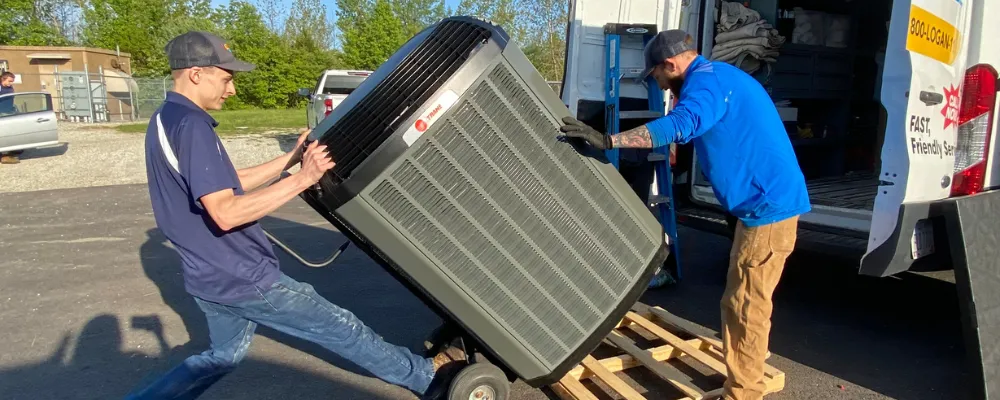
- Ensures Proper Sizing and Placement of the Unit: Proper sizing of the unit for your home and its proper placement are crucial aspects of a quality installation. If the AC unit is not sized correctly according to the area it needs to cool, it may not provide the desired cooling effect and work much harder than required, reducing its lifespan. When HVAC professionals perform installation, they’ll ensure the unit is properly sized and placed.
- Prevents Airflow Issues and Inadequate Cooling: Units that are installed incorrectly may suffer from inadequate cooling due to restricted airflow. Improper installation can impact the effectiveness of the cooling system, leading to uneven temperature distribution. Such issues can be entirely prevented with a quality installation.
- Increases Energy Efficiency: Lastly, quality installation of AC units also impacts energy efficiency. If a unit is properly installed, it will run more efficiently. Conversely, a poor installation job can result in wasted energy and needless expense.
Hiring a Professional HVAC Contractor from Logan Services A/C, Heat & Plumbing
If you’re looking to maximize the longevity of your AC unit, Logan Services A/C, Heat & Plumbing can help. With over 50 years of experience in the HVAC industry, our team knows what it takes to properly install, maintain, and repair a variety of heating and cooling systems. Plus, we carry top brands like Trane and Mitsubishi to give you the best products on the market.
